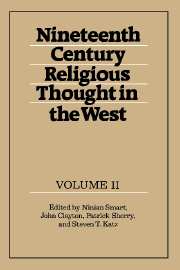Book contents
- Frontmatter
- Contents
- 1 SAMUEL TAYLOR COLERIDGE
- 2 RALPH WALDO EMERSON AND THE AMERICAN TRANSCENDENTALISTS
- 3 JOHN HENRY NEWMAN AND THE TRACTARIAN MOVEMENT
- 4 DREY, MÖHLER AND THE CATHOLIC SCHOOL OF TÜBINGEN
- 5 ROMAN CATHOLIC MODERNISM
- 6 RUSSIAN RELIGIOUS THOUGHT
- 7 BRITISH AGNOSTICISM
- 8 THE BRITISH IDEALISTS
- 9 WILLIAM JAMES AND JOSIAH ROYCE
- INDEX
6 - RUSSIAN RELIGIOUS THOUGHT
Published online by Cambridge University Press: 06 January 2010
- Frontmatter
- Contents
- 1 SAMUEL TAYLOR COLERIDGE
- 2 RALPH WALDO EMERSON AND THE AMERICAN TRANSCENDENTALISTS
- 3 JOHN HENRY NEWMAN AND THE TRACTARIAN MOVEMENT
- 4 DREY, MÖHLER AND THE CATHOLIC SCHOOL OF TÜBINGEN
- 5 ROMAN CATHOLIC MODERNISM
- 6 RUSSIAN RELIGIOUS THOUGHT
- 7 BRITISH AGNOSTICISM
- 8 THE BRITISH IDEALISTS
- 9 WILLIAM JAMES AND JOSIAH ROYCE
- INDEX
Summary
Introduction
Two of the seven religious thinkers considered in this chapter – Dostoevsky and Tolstoy – are known primarily as novelists. In this they are emblematic of a more general phenomenon of Russian culture over the past two centuries. On the one hand, many of the major Russian literary figures have been preoccupied with religious questions; on the other hand, a number of the major Russian religious thinkers have been gifted, if minor, poets or novelists.
This fusion of the literary and speculative appears to be related to the distinctively non-academic character of Russian religious thought. Most of the thinkers discussed in the other chapters of the present work – from Kant, Schelling, and Hegel, to Royce, James, and Dilthey – were lifelong university professors. There were, to be sure, in nineteenth-century Russian universities and divinity schools professors who taught theology and philosophy of religion. But most of them were compliant followers of one or another West European, Patristic, or Russian master rather than original thinkers. Of the seven religious thinkers here discussed, only Solovyov was a university professor, and that only briefly. In Russia the powerful and original religious thinkers all stood – at least until the end of the nineteenth century – outside the academy.
Compared to their Western European counterparts, Russian thinkers tended to encounter more pervasive resistance and even repression from political and ecclesiastical authorities, based on charges of heterodoxy or the ‘subversion of faith and morals’. But such harrassment was not unknown in the West, as we are reminded by the case of Fichte. Despite their difficulties with the authorities, none of the nineteenth-century religious thinkers here discussed went into exile.
- Type
- Chapter
- Information
- Nineteenth-Century Religious Thought in the West , pp. 179 - 230Publisher: Cambridge University PressPrint publication year: 1985



